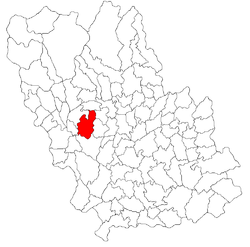Scorțeni, Prahova
| Scorţeni | |
|---|---|
| Commune | |
 Location of Scorţeni | |
| Coordinates: 45°05′35″N 25°50′55″E / 45.09306°N 25.84861°ECoordinates: 45°05′35″N 25°50′55″E / 45.09306°N 25.84861°E | |
| Country | Romania |
| County | Prahova |
| Component villages | Bordenii Mari, Bordenii Mici, Mislea, Scorțeni, Sârca |
| Population (2002) | |
| • Total | 5,927 |
| Postal code | 10752 |
Scorţeni is a commune in Prahova County, Romania.
Geography
Scorţeni is located in Prahova County, Romania with a population of about 6,000 people. Scorţeni is surrounded by the Sub-Carpathian hills, close to the 45 degrees parallel at an altitude of approximately 350 meters. The most important towns in the vicinity are: Câmpina (14 km), Băicoi (6 km), Plopeni (10 km), Ploieşti (25 km - administrative center of Prahova County) and Sinaia (40 km). The Capital city Bucharest is about 85 km far to the South.
Villages
The commune is composed of five villages: Bordenii Mari, Bordenii Mici, Mislea, Scorţeni and Sârca.
Mislea
Around 1540, Radu Paisie, the ruler of Muntenia province of those times, set up a monastery at the confluence between the rivers Mislea and Telega. On the monastery's ruins, a political prison was built by the former communist regime. The building was lately transformed into a state home.
Northward, on forested hills, lies Buştenari –an old settlement whose inhabitants have dealt with timber cut and transportation, ever since the 15th century.
To the West, Telega commune stretches its dwellings upstream the Telega River, up to the salt mines exploited for almost 700 years. Downstream Mislea river to the Est, there are the communes Scorţeni and the villages Sârca and Bordeni where the ruler Mihai Viteazul is said to have appropriated four of his captains, at the end of the 16th century.
During the first part of the Communist period, Mislea was the site of a penitentiary for female political prisoners. This became an old age home in the 1970s.[1]
References
- ↑ (Romanian) Andrei Udişteanu, "Amintiri despre temniceri în fustă", Evenimentul Zilei, June 2, 2009; accessed September 30, 2013
